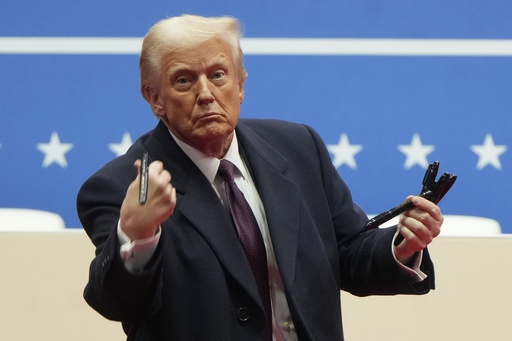
WASHINGTON — In front of a sizable audience in the capital, Donald Trump, shortly after commencing his second term as president, enacted multiple executive orders. These orders are known for their focus on what he terms “Ending Illegal Discrimination And Restoring Merit-Based Opportunity” and “Ending Radical And Wasteful Government DEI Programs and Preferencing.”
This directive has led numerous businesses across the nation to reassess and, in many cases, diminish their diversity, equity, and inclusion (DEI) strategies. However, the specifics of what Trump’s order entails and its implications remain unclear.
In this episode, we delve into the nature of these developments with insights from a deputy global business editor and a reporter.
To begin, it’s important to clarify what DEI stands for in this context. DEI isn’t a singular policy but rather a conceptual framework aimed at creating inclusive and welcoming environments within workplaces, educational institutions, and other organizations. Over time, many companies have actively sought to enhance their DEI efforts, originating from the civil rights movement’s advancements, which advocated for equal opportunities and non-discrimination in workplaces. Consequently, many organizations have implemented various initiatives, including employee resource groups for underrepresented communities, as early as the 1980s.
Trump’s executive order aimed to terminate affirmative action measures in federal contracting while mandating that all federal personnel involved in DEI efforts be put on paid leave, ultimately leading to layoffs. This move has prompted reactions from businesses across the spectrum.
In response to lawsuits instigated by conservative factions claiming discrimination in DEI policies, businesses began evaluating their DEI practices even before Trump’s recent actions. The urgency of this reassessment has intensified following his election and the subsequent executive orders targeted at shrinking DEI-related measures.
Many businesses are indeed recalibrating their DEI strategies, as noted by the deputy business editor. Initially, this shift began with smaller brand names like Tractor Supply and John Deere, but larger corporations such as Walmart and McDonald’s have also followed suit, making the repercussions of their policy rollbacks significantly impactful.
While Trump’s orders are considered aggressive, their vagueness regarding what constitutes illegal discrimination raises concerns. The orders indicate the federal government’s willingness to enforce these policies, garnering significant attention. Notably, federal contractors will now include stipulations in their contracts to ensure no engagement in what could be deemed discriminatory DEI programs, with potential financial penalties outlined under the 1863 False Claims Act for violations.
The extent of these rollbacks varies among companies. Most businesses have not entirely abandoned their DEI initiatives; instead, they are carefully sifting through which practices may come under fire as illegal. One particular area of contention is linking executive pay to diversity objectives, as critics argue that this could pressure hiring decisions based on race, which contradicts Title VII of civil rights law barring such practices.
Further complicating the landscape, businesses have begun reconsidering lesser-known DEI practices. For example, some firms have limited their sponsorship for pride events or discontinued community commitment programs established in response to social justice movements last year.
Consumer responses to these rollbacks have been mixed. Unlike the widespread backlash witnessed in 2020 following George Floyd’s death, reactions to the diminishment of DEI programs have generally been subdued. Initial calls for boycotts, particularly against companies like Target, failed to manifest into significant movements, indicating that the altered business practices have not sparked widespread outrage among consumers.
As many companies now opt to scale back their DEI strategies, it increasingly appears that this approach is becoming normalized within the industry. While organizations such as Apple and Microsoft continue to champion their DEI commitments, the silence from most others suggests a broader trend toward a reduction in such initiatives.
Uncertainties remain regarding what activities will ultimately be deemed discriminatory under the new guidelines, leading to confusion among businesses. Some companies have felt the political pressure to forego certain social celebrations or initiatives, contributing to the prevailing uncertainty about compliance with anti-discrimination laws.
Companies are exercising caution, particularly with potential Supreme Court interventions regarding these issues. Notably, many businesses navigating these waters are keen to publicly affirm their ongoing commitment to DEI rights—though their actions tell a different story.
This analysis sheds light on the complexities facing businesses as they tread the fine line between compliance, social expectation, and political pressures relevant to diversity and inclusion strategies in the current sociopolitical climate.

